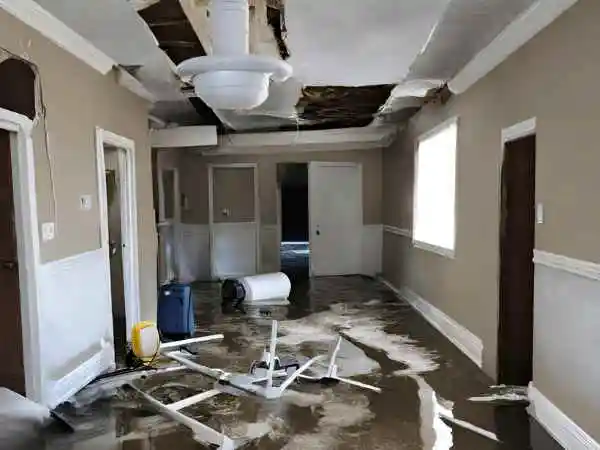Water damage restoration is a time-sensitive process vital for repairing properties affected by water damage. The duration varies based on factors like damage extent, water type, and restoration methods.
Key factors that impact the time needed for water damage restoration.
1. Extent of Water Damage:
The extent of water damage plays a pivotal role in determining the duration of the restoration process. Minor water damage, like that resulting from a small pipe leak, can typically be addressed relatively swiftly. In contrast, substantial water damage stemming from events such as natural disasters or burst pipes often demands a considerably more extended timeframe for comprehensive repair and restoration.
2. Type of Water:
Water damage can be categorized into three types: clean water, gray water, and black water. Clean water is from sources like broken pipes, while gray water may contain contaminants from appliances or sinks. Black water is highly contaminated and often comes from sewage backups or natural disasters. Cleaning and restoring black water damage typically takes longer due to the need for thorough sanitation.
3. Drying Time:
The duration of the drying process significantly impacts water damage restoration. It hinges on variables such as humidity levels, temperature, and the choice of drying equipment. Dehumidifiers, fans, and other specialized tools are employed to expedite this crucial phase. Complete drying of a structure may span several days in certain cases, influenced by the intricacies of the environment and the extent of the water damage.
4. Mold Growth:
Water damage can lead to mold growth if not addressed promptly. Mold can begin to develop within 24-48 hours after water exposure. If mold is discovered during the restoration process, it can significantly extend the timeline, as mold removal and remediation must be carried out before the restoration can proceed.
5. Structural Damage:
If the water damage has caused structural damage to the building, such as compromised foundations or load-bearing walls, the restoration process will naturally take longer. Structural repairs may need to be completed before other restoration work can begin.
6. Insurance Claims and Approvals:
The process may also be influenced by insurance claims and approvals. Waiting for insurance adjusters to assess the damage and approve the restoration plan can lead to delays.
7. Size and Complexity of the Property:
Larger and more complex properties will naturally require more time for restoration. Commercial buildings, for example, typically take longer to restore than residential properties due to their size and complexity.
8. Availability of Equipment and Labor:
The availability of equipment and skilled labor is another crucial factor. If a restoration company is already working on multiple projects or if specialized equipment is in high demand, it can slow down the restoration process.
9. Personal Belongings:
Restoring personal belongings and furniture can also impact the timeline. Salvaging and restoring items like furniture, electronics, and personal possessions can add time to the overall restoration process.
10. Reconstruction and Refinishing:
Once the structural and functional elements of the property are restored, the finishing touches, such as repainting, replacing flooring, and other aesthetic improvements, can add to the timeline.
How to find reliable experts in water and fire restoration
Securing dependable experts in water and fire restoration in Vancouver, WA is elemental when facing the aftermath of these calamities. You need professionals with experience, trustworthiness, and competence to restore your property to its pre-damage state. To guide you in this endeavor, here are some steps for finding reliable experts in water and fire restoration:
1. Ask for Recommendations:
Start by asking friends, family, neighbors, or colleagues if they have had experiences with restoration companies. Personal recommendations are often a great way to find reliable experts. Additionally, your insurance company may have preferred restoration contractors they work with and can recommend.
2. Online Research:
Utilize the internet to search for restoration companies in your area. Websites and online directories can provide you with a list of potential companies to consider. Look for businesses with positive reviews and testimonials from previous clients.
3. Get Multiple Quotes:
Request quotes from several restoration companies. A detailed written estimate should include a breakdown of the costs and the scope of work. Compare these quotes to ensure they are reasonable and competitive.
Causes of water damage
Here are some common causes of water damage:
- Leaking or Burst Pipes.
- Plumbing Issues
- Roof Leaks
- Clogged Drains and Gutters
- Natural Disasters
- Sewage Backups
- Foundation Cracks
- Appliance Failures
- HVAC Issues
- Poorly Installed or Damaged Windows
- Overland Flooding
- Exterior Issues
- Humidity and Condensation
- Freezing and Thawing
- Mold and Mildew Growth
Understanding these common causes of water damage is elemental for taking preventative measures and addressing water-related issues promptly. Regular maintenance, inspection, and prompt repairs can help homeowners and property managers reduce the risk of water damage. Additionally, having a plan in place for dealing with water damage when it occurs is crucial to minimize its impact.


